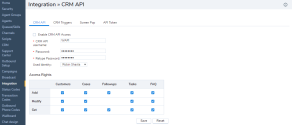To access 8x8 Contact Center CRM data, 8x8 Contact Center administrators can use 8x8 CRM API in 8x8 Configuration Manager. The 8x8 CRM API component of the integration suite enables you to develop external programs to access data for customers, cases, tasks, follow-up records, and FAQs.
The 8x8 CRM API uses HTTP or HTTPS to transmit requests and receives responses formatted as Extensible Mark-up Language (XML). All these API queries are authenticated by account access credentials.
Note: For APIs customization in the 8x8 Contact Center, check with your system administrators or developers to ensure that the system SSL libraries are updated to support TLS 1.2 or better. Affected products may include, but are not limited to, older distributions of Linux-based operating systems (using old versions of OpenSSL) or Java Runtime Environments (JRE) older than 1.8.
To configure 8x8 CRM API:
- From the Configuration Menu, open Integration.
- Go to the CRM API tab.
- Specify the account credentials and access rights used by an external process to access the Local CRM database.

The following table summarizes the options under Integration > CRM API:
| CRM API Option | Description |
|---|---|
| Enable CRM API Access | Select to enable a third-party process to access the Local CRM database. The third-party process uses the credentials entered for 8x8 CRM API username and password. |
| CRM API username | Do not reuse a user account name. Type a username created exclusively to service 8x8 CRM API XML access to the Local CRM database. |
| Password, Retype Password | Type the password required to access the Local CRM database. |
| Used Identify | Select the user account name associated with activities performed by the 8x8 CRM API. In reports, interaction activity performed by the 8x8 CRM API matches the value of Used Identify. |
| Access Rights | Choose the operations the third-party process allows to perform on the Local CRM.
Note: The 8x8 CRM API cannot delete data from the Local CRM. |
To completely configure bi-directional exchange of information to and from an external process and the Local CRM database, use the CRM Triggers page to transmit URLs to a third-party process when the Local CRM database records are modified. For details on CRM Triggers, refer to Configure External CRM Triggers.